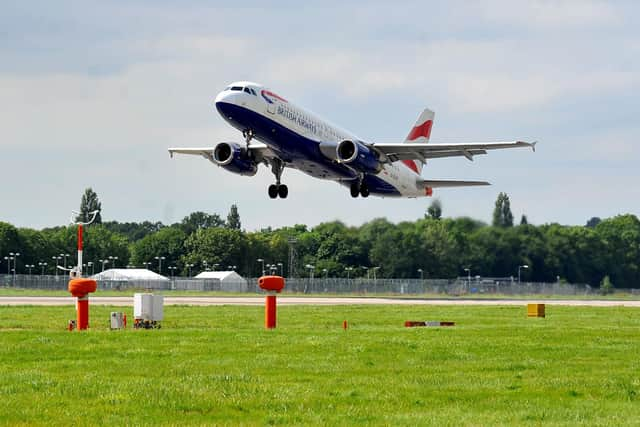Campaign group says air quality findings must question any expansion of Gatwick Airport
This article contains affiliate links. We may earn a small commission on items purchased through this article, but that does not affect our editorial judgement.
and live on Freeview channel 276
Dr Gary Fuller, who spoke last year as part of the CAGNE (Communities Against Gatwick Noise and Emissions) Time is Ticking series of environmental webinars to the ramifications of Gatwick Airport expansion plans, has finalised the report into the sources of particle number concentration and noise near Gatwick Airport.
The airport is currently working through the responses to their public consultation to bring the Northern Runway into routine use. Gatwick CEO Stewart Wingate told us on Friday: "We are currently through all of the responses we got, which was obviously the purpose of doing that consultation. We will then take those responses to help to put a better case forward to the planning inspectorate.
Advertisement
Hide AdAdvertisement
Hide AdHAVE YOU SEEN? Gatwick Airport chief on South Terminal reopening, travel restrictions easing and the creation of 5,000 additional jobs | Gatwick Airport station upgrade moves forward as eight new escalators are installed - watch the timelapse video here | Gatwick Airport jobs fair with 2,600 jobs available attracts hundreds


"We expect to submit that planning case towards the end of this year, go through an examination period next year and hopefully get a positive decision that says we can go ahead with our plans to routinely use the Northern Runway in 2024."
CAGNE have been raising concerns about air and noise pollution throughout the public consultation.
Dr Fuller, an air pollution scientist at Imperial College London, wrote in his report: "Ultrafine particles are not just a problem in the skies above us. Airports are a large source, and my latest research has been searching for these tiny particles close to Gatwick. They were not hard to find.
Advertisement
Hide AdAdvertisement
Hide Ad"The number of ultrafine particles 500 metres downwind of the airport was greater than those at the kerb of London’s busiest roads.
"They mostly came from aircraft during take-off and landing, but traffic, car parks and a large catering facility used to cook airline food all added to the problem."
The CAGNE Committee said: "These findings must seriously question any expansion at Gatwick Airport, from the main runway and with a 2nd runway, as the Environment Act that has passed into law seeks to clean up the country’s air as one of its four key priorities. It is also to be included in all government department decisions.”
The Horley site for measuring particles was often downwind of the airport as the predominant wind direction is from the south-west as such receives the fallout from the airport compared to Pole Lane to the south of the airport.
Advertisement
Hide AdAdvertisement
Hide AdDr Fuller's research interests focus on the urban air pollution, how this is changing in response to policy initiatives, and how it affects our health.
In 2021 the Dutch Health Council and the World Health Organisation highlighted the growing evidence that ultrafine particles are damaging residents’ health. This included 75 studies mostly relating to lung inflammation, blood pressure and heart problems.
“We are yet to understand the spread of ultrafine particles from Gatwick, but we do know they can travel a long way,” writes Dr Fuller.
A Gatwick spokesperson said: “We continue to work with Reigate and Banstead Borough Council to monitor and manage air quality, and publish results annually.
Advertisement
Hide AdAdvertisement
Hide Ad"Our Decade of Change sustainability policy sets out our ambition to continue Gatwick’s net zero transition and further improve air quality by reducing the airport’s own direct emissions (Scope 1 and 2) by a further 25% by 2030 – so that emissions have reduced by 80% against a 1990 baseline - as part of a science-based goal of reaching net zero before 2040.
“We are also working with airlines and fuel providers to implement the Sustainable Aviation decarbonisation roadmap and interim goals, and to set a science-based target for Gatwick. In addition we are working with transport partners to increase public transport and zero and ultra-low emission journeys to 60% by 2030.”
To find out more, please visit: https://www.gatwickairport.com/sustainability/
Comment Guidelines
National World encourages reader discussion on our stories. User feedback, insights and back-and-forth exchanges add a rich layer of context to reporting. Please review our Community Guidelines before commenting.